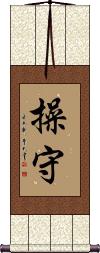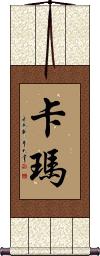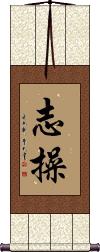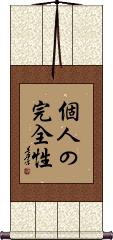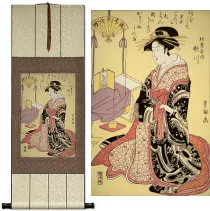Many custom options...
And formats...

Personal in Chinese / Japanese...
Buy a Personal calligraphy wall scroll here!
Personalize your custom “Personal” project by clicking the button next to your favorite “Personal” title below...
Fidelity / Personal Integrity / Honor
操守 is the Chinese and Japanese Kanji for personal integrity, constancy, fidelity, and honor/honour.
The original meaning of the first character is chastity, fidelity, honor, and/or faith.
The second character means to defend, guard, keep watch, and be observant.
So, this is about being observant of and guarding your integrity and honor.
Karma
Transliterated personal name
卡瑪 is the most common transliteration to Mandarin Chinese for the name Karma.
Note: This sounds like Karma but does not have the meaning of Karma in Chinese. See our other entry if you are looking for the Buddhist idea of Karma.
In fact, if your name is Karma, I strongly suggest that you use a word that means Karma, rather than this one that sounds like Karma (meaning is more important and universal in Chinese/Japanese/Korean).
Personal Integrity
志操 is personal integrity - basically, holding yourself to a higher standard of honesty and reliability. These two characters also contain the ideas of constancy, principles, and faithfulness.
Note: In Japanese, this just means “principle.”
Personal Integrity
This in-stock artwork might be what you are looking for, and ships right away...
Gallery Price: $108.00
Your Price: $59.88
These search terms might be related to Personal:
...And This Above All to Thine Own Self Be True
Choose Your Own Destiny
I Control My Own Destiny
I Walk My Own Path
Mind Your Own Business
No Man Knows What He Owes to His Parents Until He Comes to Have Children of His Own
Soldier / Private
Special / Extraordinary
The Farts of Others Stink, but One’s Own Smells Sweet
To Thine Own Self Be True
Not the results for personal that you were looking for?
Below are some entries from our dictionary that may match your personal search...
| Characters If shown, 2nd row is Simp. Chinese |
Pronunciation Romanization |
Simple Dictionary Definition |
人柄 see styles |
hitogara ひとがら |
More info & calligraphy: Character |
大名 see styles |
dà míng da4 ming2 ta ming daimyou / daimyo だいみょう |
More info & calligraphy: Daimyo / Great Name(hist) (See 小名) daimyo (Japanese feudal lord); (place-name) Daimyou Mahānāman |
布施 see styles |
bù shī bu4 shi1 pu shih fuse ふせ |
More info & calligraphy: Dana: Almsgiving and Generosity(n,vs,vi) (1) {Buddh} alms-giving; charity; (n,vs,vi) (2) {Buddh} offerings (usu. money) to a priest (for reading sutras, etc.); (surname) Fuho dāna 檀那; the sixth pāramitā, almsgiving, i. e. of goods, or the doctrine, with resultant benefits now and also hereafter in the forms of reincarnation, as neglect or refusal will produce the opposite consequences. The 二種布施 two kinds of dāna are the pure, or unsullied charity, which looks for no reward here but only hereafter; and the sullied almsgiving whose object is personal benefit. The three kinds of dāna are goods, the doctrine, and courage, or fearlessness. The four kinds are pens to write the sutras, ink, the sutras themselves, and preaching. The five kinds are giving to those who have come from a distance, those who are going to a distance, the sick, the hungry, those wise in the doctrine. The seven kinds are giving to visitors, travellers, the sick, their nurses, monasteries, endowments for the sustenance of monks or nuns, and clothing and food according to season. The eight kinds are giving to those who come for aid, giving for fear (of evil), return for kindness received, anticipating gifts in return, continuing the parental example of giving, giving in hope of rebirth in a particular heaven, in hope of an honoured name, for the adornment of the heart and life. 倶舍論 18. |
操守 see styles |
cāo shǒu cao1 shou3 ts`ao shou tsao shou soushu / soshu そうしゅ |
More info & calligraphy: Fidelity / Personal Integrity / Honorconstancy; fidelity |
独自 see styles |
dokuji どくじ |
More info & calligraphy: Alone / A Lone Person |
禪宗 禅宗 see styles |
chán zōng chan2 zong1 ch`an tsung chan tsung Zenshū |
More info & calligraphy: Zen BuddhismThe Chan, meditative or intuitional, sect usually said to have been established in China by Bodhidharma, v. 達, the twenty-eighth patriarch, who brought the tradition of the Buddha-mind from India. Cf. 楞 13 Laṅkāvatāra sūtra. This sect, believing in direct enlightenment, disregarded ritual and sūtras and depended upon the inner light and personal influence for the propagation of its tenets, founding itself on the esoteric tradition supposed to have been imparted to Kāśyapa by the Buddha, who indicated his meaning by plucking a flower without further explanation. Kāśyapa smiled in apprehension and is supposed to have passed on this mystic method to the patriarchs. The successor of Bodhidharma was 慧可 Huike, and he was succeeded by 僧璨 Sengcan; 道信 Daoxin; 弘忍 Hongren; 慧能 Huineng, and 神秀 Shenxiu, the sect dividing under the two latter into the southern and northern schools: the southern school became prominent, producing 南嶽 Nanyue and 靑原 Qingyuan, the former succeeded by 馬祖 Mazu, the latter by 石頭 Shitou. From Mazu's school arose the five later schools, v. 禪門. |
マック see styles |
makku マック |
More info & calligraphy: Mack |
悉達多 悉达多 see styles |
xī dá duō xi1 da2 duo1 hsi ta to shiddaruta しっだるた |
More info & calligraphy: Siddhartha(personal name) Shiddaruta (悉達) Siddhārtha, Sarvāthasiddha, also悉多 (悉多頞他); 悉陀 the realization of all aims, prosperous; personal name of Śākyamuni. |
釋迦牟尼 释迦牟尼 see styles |
shì jiā móu ní shi4 jia1 mou2 ni2 shih chia mou ni Shakamuni |
More info & calligraphy: Shakyamuni / The Buddha釋迦文 (釋迦文尼); 釋伽文 Śākyamuni, the saint of the Śākya tribe. muni is saint, holy man, sage, ascetic monk; it is: intp. as 仁 benevolent, charitable, kind, also as 寂默 one who dwells in seclusion. After '500 or 550' previous incarnations, Śākyamuni finally attained to the state of Bodhisattva, was born in the Tuṣita heaven, and descended as a white elephant, through her right side, into the womb of the immaculate Māyā, the purest woman on earth; this was on the 8th day of the 4th month; next year on the 8th day of the 2nd month he was born from her right side painlessly as she stood under a tree in the Lumbinī garden. For the subsequent miraculous events v. Eitel. also the 神通遊戲經 (Lalitavistara), the 釋迦如來成道記, etc. Simpler statements say that he was born the son of Śuddhodana, of the kṣatriya caste, ruler of Kapilavastu, and Māyā his wife; that Māyā died seven days later, leaving him to be brought up by her sister Prājapati; that in due course he was married to Yaśodharā who bore him a son, Rāhula; that in search of truth he left home, became an ascetic, severely disciplined himself, and finally at 35 years of age, under a tree, realized that the way of release from the chain of rebirth and death lay not in asceticism but in moral purity; this he explained first in his four dogmas, v. 四諦 and eightfold noble way 八正道, later amplified and developed in many sermons. He founded his community on the basis of poverty, chastity, and insight or meditation, ad it became known as Buddhism, as he became known as Buddha, the enlightened. His death was probably in or near 487 B.C., a few years before that of Confucius in 479. The sacerdotal name of his family is Gautama, said to be the original name of the whole clan, Śākya being that of his branch, v. 瞿, 喬.; his personal name was Siddhārtha, or Sarvārthasiddha, v. 悉. |
丘 see styles |
qiū qiu1 ch`iu chiu tsukasa つかさ |
mound; hillock; grave; classifier for fields (archaism) mound; hill; (1) hill; height; knoll; rising ground; (2) (mahj) (kana only) bonus points awarded to the winner at the end of a game; (female given name) Tsukasa A mound, a plot; personal name of Confucius. |
儀 仪 see styles |
yí yi2 i gi ぎ |
apparatus; rites; appearance; present; ceremony (1) ceremony; (2) matter; affair; case; (suffix) (3) (used in letters, official notices, etc. after a person's name, personal pronoun, etc.) with regard to; as for; as concerns; (given name) Tadashi Manner, mode, style; ceremony, etiquette. |
厥 see styles |
jué jue2 chüeh ketsu |
to faint; to lose consciousness; his; her; its; their Third personal pronoun; demonstrative pronoun; also used instead of 倶. |
妲 see styles |
dá da2 ta |
female personal name (archaic) |
己 see styles |
jǐ ji3 chi ki; tsuchinoto き; つちのと |
self; oneself; sixth of the ten Heavenly Stems 十天干[shi2 tian1 gan1]; sixth in order; letter "F" or Roman "VI" in list "A, B, C", or "I, II, III" etc; hexa 6th in rank; sixth sign of the Chinese calendar; (place-name) Ki Self, personal, own. |
徇 see styles |
xùn xun4 hsün tonau となう |
to give in to; to be swayed by (personal considerations etc); Taiwan pr. [xun2]; to follow; to expose publicly; variant of 侚[xun4]; variant of 殉[xun4] (given name) Tonau |
手 see styles |
shǒu shou3 shou te て |
hand; (formal) to hold; person engaged in certain types of work; person skilled in certain types of work; personal(ly); convenient; classifier for skill; CL:雙|双[shuang1],隻|只[zhi1] (1) (occ. pronounced た when a prefix) (See お手・おて・1) hand; arm; (2) (colloquialism) (See お手・おて・3) forepaw; foreleg; (3) handle; (4) hand; worker; help; (5) trouble; care; effort; (6) means; way; trick; move; technique; workmanship; (7) hand; handwriting; (8) kind; type; sort; (9) (See 手に入る) one's hands; one's possession; (10) (See 手に余る) ability to cope; (11) hand (of cards); (12) (See 山の手・1) direction; (n,n-suf,ctr) (13) move (in go, shogi, etc.); (surname) Tezaki pāṇī; hasta; kara; hand, arm. |
昀 see styles |
yún yun2 yün |
sun light; used in personal name |
私 see styles |
sī si1 ssu wate わて |
personal; private; selfish (pronoun) (dated) (kana only) (ksb:) I; me; (surname) Kisai Private, secret, selfish, illicit. |
等 see styles |
děng deng3 teng ra ら |
to wait for; to await; by the time; when; till; and so on; etc.; et al.; (bound form) class; rank; grade; (bound form) equal to; same as; (used to end an enumeration); (literary) (plural suffix attached to a personal pronoun or noun) (suffix) (1) (kana only) pluralizing suffix; (suffix) (2) (kana only) (See あちら,いくら・1) or so; rough indicator of direction, location, amount, etc.; (suffix) (3) (kana only) (after the stem of an adjective) (See 清ら) nominalizing suffix; (s,m,f) Hitoshi To pair; parallel, equal, of like order; a class, grade, rank; common; to wait; sign of plural. In Buddhist writings it is also used for 'equal everywhere', 'equally everywhere', 'universal'. |
自 see styles |
zì zi4 tzu ji じ |
(bound form) self; oneself; from; since; naturally; as a matter of course (prefix) (1) self-; (prefix) (2) (See 至) from (a time or place); (female given name) Mizu sva, svayam; the self, one' s own, personal; of itself, naturally, of course; also, from (i. e. from the self as central). 自 is used as the opposite of 他 another, other's, etc., e. g. 自力 (in) one's own strength as contrasted with 他力 the strength of another, especially in the power to save of a Buddha or Bodhisattva. It is also used in the sense of ātman 阿怛摩 the self, or the soul. |
辻 see styles |
shí shi2 shih tsuji つじ |
(Japanese kokuji) street corner; intersection; used in Japanese personal and place names; pr. tsuji (1) crossroads; crossing; intersection; street corner; (2) street; (surname) Tsuji |
PC see styles |
pii shii; piishii(sk) / pi shi; pishi(sk) ピー・シー; ピーシー(sk) |
(1) PC; personal computer; (2) prestressed concrete; (3) precast concrete; (4) (See ポリカーボネート) polycarbonate; (5) (See ポリティカルコレクトネス) political correctness; (6) (See パトロールカー) patrol car; police car; (7) (See パブリックコメント) public comment; (8) (See プレイヤーキャラクター) player character |
パソ see styles |
paso パソ |
(abbreviation) {comp} personal (computer); (personal name) Ba so |
ヒム see styles |
pimu ピム |
{comp} personal information manager; PIM; (personal name) Pym |
まい see styles |
mai マイ |
(prefix) (See マイホーム) my; one's own; personal; privately owned; (female given name) Mai; Maj |
一己 see styles |
yī jǐ yi1 ji3 i chi ikko いっこ |
oneself (noun - becomes adjective with の) personal; private; oneself; (female given name) Kazumi |
三乘 see styles |
sān shèng san1 sheng4 san sheng minori みのり |
(surname) Minori Triyāna, the three vehicles, or conveyances which carry living beings across saṁsāra or mortality (births-and-deaths) to the shores of nirvāṇa. The three are styled 小,中, and 大. Sometimes the three vehicles are defined as 聲聞 Śrāvaka, that of the hearer or obedient disciple; 緣覺Pratyeka-buddha, that of the enlightened for self; these are described as 小乘 because the objective of both is personal salvation; the third is 菩薩Bodhisattva, or 大乘 Mahāyāna, because the objective is the salvation of all the living. The three are also depicted as 三車 three wains, drawn by a goat, a deer, an ox. The Lotus declares that the three are really the One Buddha-vehicle, which has been revealed in three expedient forms suited to his disciples' capacity, the Lotus Sūtra being the unifying, complete, and final exposition. The Three Vehicles are differently explained by different exponents, e.g. (1) Mahāyāna recognizes (a) Śrāvaka, called Hīnayāna, leading in longer or shorter periods to arhatship; (b) Pratyeka-buddha, called Madhyamayāna, leading after still longer or shorter periods to a Buddhahood ascetically attained and for self; (c) Bodhisattva, called Mahayana, leading after countless ages of self-sacrifce in saving others and progressive enlightenment to ultimate Buddhahood. (2) Hīnayāna is also described as possessing three vehicles 聲, 緣, 菩 or 小, 中, 大, the 小 and 中 conveying to personal salvation their devotees in ascetic dust and ashes and mental annihilation, the 大 leading to bodhi, or perfect enlightenment, and the Buddha's way. Further definitions of the Triyāna are: (3) True bodhisattva teaching for the 大; pratyeka-buddha without ignorant asceticism for the 中; and śrāvaka with ignorant asceticism for the 小. (4) (a) 一乘 The One-Vehicle which carries all to Buddhahood: of this the 華嚴 Hua-yen and 法華 Fa-hua are typical exponents; (b) 三乘法 the three-vehicle, containing practitioners of all three systems, as expounded in books of the 深密般若; (c) 小乘 the Hīnayāna pure and simple as seen in the 四阿合經 Four Āgamas. Śrāvakas are also described as hearers of the Four Truths and limited to that degree of development; they hear from the pratyeka-buddhas, who are enlightened in the Twelve Nidānas 因緣; the bodhisattvas make the 六度 or six forms of transmigration their field of sacrificial saving work, and of enlightenment. The Lotus Sūtra really treats the 三乘. Three Vehicles as 方便 or expedient ways, and offers a 佛乘 Buddha Vehicle as the inclusive and final vehicle. |
三力 see styles |
sān lì san1 li4 san li sanriki |
The three powers, of which there are various groups: (1) (a) personal power; (6) tathāgata-power; (c) power of the Buddha-nature within. (2) (a) power of a wise eye to see the Buddha-medicine (for evil); (b) of diagnosis of the ailment; (c) of suiting and applying the medicine to the disease. (3) (a) the power of Buddha; (b) of samādhi; (c) of personal achievement or merit. |
主観 see styles |
shukan しゅかん |
(1) subjectivity; subject (philosophical); ego; (2) one's personal opinion; one's own idea |
乾隆 see styles |
qián lóng qian2 long2 ch`ien lung chien lung kenryuu / kenryu けんりゅう |
Qianlong Emperor (1711-1799), sixth Qing emperor, princely title 寶親王|宝亲王[Bao3 Qin1 wang2], personal name 弘曆|弘历[Hong2 li4], reigned 1735-1799 (hist) Qianlong era (of emperor Gaozong of Qing; 1735-1796) |
Click here for more personal results from our dictionary
The following table may be helpful for those studying Chinese or Japanese...
| Title | Characters | Romaji (Romanized Japanese) | Various forms of Romanized Chinese | |
| Fidelity Personal Integrity Honor | 操守 | soushu / soshu | cāo shǒu / cao1 shou3 / cao shou / caoshou | ts`ao shou / tsaoshou / tsao shou |
| Karma | 卡瑪 卡玛 | kǎ mǎ / ka3 ma3 / ka ma / kama | k`a ma / kama / ka ma | |
| Personal Integrity | 志操 / 誌操 志操 | shi sou / shisou / shi so | zhì cāo / zhi4 cao1 / zhi cao / zhicao | chih ts`ao / chihtsao / chih tsao |
| Personal Integrity | 個人の完全性 | ko jin no kan zen sei kojinnokanzensei | ||
| In some entries above you will see that characters have different versions above and below a line. In these cases, the characters above the line are Traditional Chinese, while the ones below are Simplified Chinese. | ||||
Successful Chinese Character and Japanese Kanji calligraphy searches within the last few hours...
